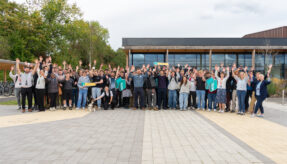
BAE Systems has called for a concentrated effort by industry, Government and the education sector to ensure the UK can fully benefit from the digital revolution and Industry 4.0.
Nigel Whitehead, BAE Systems Chief Technology Officer, stated that defence, aerospace, engineering and manufacturing sectors need to work together and prioritise investment in digital and ‘soft skills’, upskilling and retraining and supporting supply chains and SMEs, to respond to the expected levels of complexity in industrial and business systems and unprecedented demand from technologies such as artificial intelligence.
Mr Whitehead also suggested that businesses in these sectors need to create a more diverse, inclusive and flexible workplace by reflecting different working preferences and lifestyles. To help address the UK’s shortage of engineers, he called for a nationwide programme of activity to improve the perception of science, technology, engineering and maths (STEM) subjects and careers and for the engineering industry to consider recruiting more people with highly applicable skills that traditionally are more associated with arts subjects, such as creativity and problem solving.
In a whitepaper titled ‘Future Skills for our UK Business’, BAE Systems set out 6 guiding principles for the development of skills in the UK in an environment of rapid technological change and fierce global competition:
- Create a more diverse, inclusive and flexible workplace for the employees of tomorrow; the UK must attract and retain top class talent;
2. Commit to retraining and upskilling; it is vital for innovation and growth that employees continue to learn throughout their careers;
3. Prioritise investment in digital, soft and behavioural skills; to give the employees the broad range of technical and people skills needed to succeed in the modern workplace;
4. Continue to support suppliers and the SME community so that they can develop skills in the digitally-enabled workplace; successful and innovative partners help the UK economy thrive;
5. Continue to improve the perception of STEM subjects and careers; encouraging graduates and young people into a dynamic and rewarding industry;
6. Continue to champion vocational training; working with Government to ensure training is funded and prioritised.
At a launch event hosted at the Company’s Academy for Skills & Knowledge in Samlesbury, Lancashire, Nigel Whitehead, said: “By taking tangible action now and capitalising on the ambition of young people coupled with the UK’s traditions and advantages – education, strong legal frameworks, technical innovations and leadership – we can exploit the digital revolution and compete on the world stage.”
If you would like to join our community and read more articles like this then please click here.







